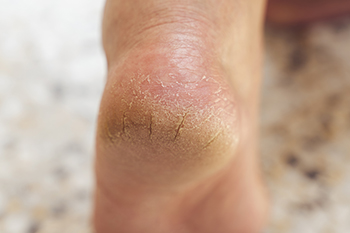
Cracked heels, also known as heel fissures, occur when the skin on the heels becomes dry and thickened, leading to painful cracks, termed fissures. This condition often results from excessive pressure, poor foot hygiene, or prolonged exposure to dry environments. Common causes include wearing open-backed shoes, standing for long periods of time, and having underlying conditions like diabetes or eczema. Risk factors include obesity, lack of moisture, and certain medical conditions that affect skin health. Symptoms of cracked heels often include rough, thickened skin on the heels, visible cracks, and discomfort or pain, particularly while walking. Painful cracked heels can interfere with completing daily activities. If you have developed this condition, it is strongly suggested that you visit a podiatrist who can offer treatment, which may include prescribed medication.
If the skin on your feet starts to crack, you may want to see a podiatrist to find treatment. If you have any concerns, contact Ali Davis, DPM from The Foot Clinic. Our doctor can provide the care you need to keep you pain-free and on your feet.
Cracked Heels
It is important to moisturize your cracked heels in order to prevent pain, bleeding, and infection. The reason cracked heels form is because the skin on the foot is too dry to support the immense pressure placed on them. When the foot expands, the dry skin on the foot begins to split.
Ways to Help Heal Them
- Invest in a good foot cream
- Try Using Petroleum Jelly
- Ease up on Soaps
- Drink Plenty of Water
Ways to Prevent Cracked Heels
- Moisturize After Showering
- Skip a Shower
- Keep Shower Water Lukewarm
- Don’t Scrub Your Feet
If you are unsure how to proceed in treating cracked heels, seek guidance from a podiatrist. Your doctor will help you with any questions or information you may need.
If you have any questions, please feel free to contact our office located in Overland Park, KS . We offer the newest diagnostic and treatment technologies for all your foot care needs.
